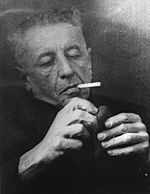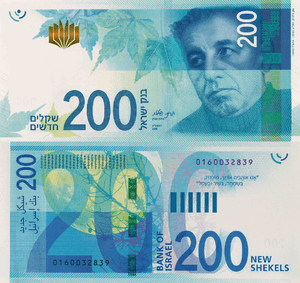Nathan Alterman facts for kids
Quick facts for kids
Nathan Alterman
|
|
|---|---|

Nathan Alterman in 1952
|
|
| Born | August 14, 1910 Warsaw, Congress Poland, Russian Empire |
| Died | March 28, 1970 (aged 59) Tel Aviv, Israel |
| Occupation | poet, translator, playwright, journalist |
| Nationality | Israeli (since 1948) |
| Literary movement | Yakhdav (led by Avraham Shlonsky) |
| Spouse | Rachel Marcus |
| Children | Tirza Atar |
Nathan Alterman (Hebrew: נתן אלתרמן, August 14, 1910 – March 28, 1970) was a very important Israeli poet, playwright (someone who writes plays), journalist, and translator. Even though he was never an elected official, Alterman had a big impact on Socialist Zionist politics. This was true both before and after the country of Israel was created.
Contents
Nathan Alterman's Early Life
Nathan Alterman was born in Warsaw, Poland, in 1910. At that time, Poland was part of the Russian Empire. When he was 15 years old, in 1925, he moved to Tel Aviv with his family. He continued his studies at the Herzliya Hebrew High School.
When Alterman was 19, he traveled to Paris, France. He planned to study at the University of Paris. A year later, he decided to study farming (agronomy) in Nancy. He stayed in France for three years. He visited his family and friends in Tel Aviv during holidays. French artists and writers he met there greatly influenced him. In 1932, he returned to Tel Aviv. He first worked at an agricultural school, but soon left to become a journalist and poet.
Alterman is also known for bringing the seeds of the marmande tomato to Israel. This type of tomato was the main one grown in the country until the 1960s.
Nathan Alterman's Writing Career
Alterman's first poetry book was Kokhavim Bakhuts ("Stars Outside"). It was published in 1938. This book made him a major writer in modern Hebrew literature. Critics said it had "neo-romantic themes" and "metrical virtuosity." This means his poems had a romantic feel and a very skilled use of rhythm and rhyme.
His next big book was "The Joy of the Poor" (Hebrew: שִׂמְחת עניים ṡimḥàt aniyím). It came out in 1941. This book has 31 poems that are all connected. They tell the story from the point of view of a ghost. This ghost is obsessed with the living woman he loves. It's like a spooky thriller! The ghost wants to protect her from war and poverty. But he also wants to bring her into his world. His plans are always stopped, even by a small candle flame. The story is exciting, but the poems have regular rhymes and elegant rhythms.
Poems About Important Events
In 1942, news about the Holocaust reached the Jewish community in British Mandate Palestine. Alterman wrote a powerful poem about it. It was a sarcastic version of a Jewish prayer. In the poem, he wrote that the world did not react to the cries of Jewish children. He said that Jewish children knew their blood would not be counted like others. In 1943, Alterman wrote another poem. It praised Sweden for helping Jewish refugees from Denmark.
He also wrote a poem in 1943 that criticized Pope Pius XII. This poem is now shown at the Yad Vashem museum. Yad Vashem is a memorial to the victims of the Holocaust.
From 1945 to 1947, Alterman wrote a weekly column. It was in the "Davar" newspaper. In his columns, he spoke out against the British army's harsh actions. He praised the ships that brought Jewish holocaust survivors to the country. These ships were called "illegal immigrant boats" because they went against British rules. One famous column from 1945 was "In Praise of an Italian Captain."
The Silver Platter Poem
During the early part of the 1948 Arab–Israeli War, Alterman wrote many patriotic poems. The most famous one is "The Silver Platter" (Hebrew: מגש הכסף magásh ha-késef). This poem is now read every year on Israel's Remembrance Day. He wrote it after Chaim Weizmann said in 1947, "No state is ever handed on a silver platter." Weizmann meant that the UN plan gave Jews an opportunity, not a ready-made state.
In his poem, Alterman describes a scene like the Biblical story of Mount Sinai. The Jewish people are waiting to receive their new state. But instead of Moses with stone tablets, two young people appear. They are a boy and a girl, wounded and very tired. When asked who they are, they reply, "We are the silver platter on which the state of the Jews was handed to you." This poem means that the state of Israel was created through the sacrifice of its young people.
Translations and Songs
Alterman translated many classic plays into Hebrew and Yiddish. He translated works by Shakespeare, Molière, and Racine. He also translated Russian classics. He wrote the words for the famous song Kalaniyot. Moshe Vilenski wrote the music, and Shoshana Damari sang it.
Some of Alterman's poems have become popular songs. One example is "A meeting with no end" (פגישה לאין קץ). An episode of the Israeli Netflix show Shtisel is named after his poem, "First Smile." This poem is read at a memorial service in the show.
Nathan Alterman's Political Views
In the 1950s, Alterman was against the martial law that was placed on Arab citizens in Israel. This law lasted until 1966. He also strongly supported workers' rights. For example, he supported the 1952 sailors' strike. The government, led by David Ben-Gurion, stopped this strike.
After the Six-Day War, Alterman helped start the Movement for Greater Israel. This meant he was working with right-wing activists. This was surprising because he had disagreed with them earlier in his life. He criticized David Ben-Gurion for being too willing to give up land captured during the war. Ben-Gurion wanted to give up land for a peace agreement.
Awards and Recognition
Nathan Alterman has been honored in many ways for his work:
- In 1946, he won the Tchernichovsky Prize. This was for his excellent translations of plays like Phèdre by Jean Racine and Merry Wives of Windsor by Shakespeare.
- In 1947, he received the Ruppin Prize for his book "Joy of the Poor."
- In 1957, Alterman was given the Bialik Prize for literature.
- In 1967, he won the Tchernichovsky Prize again. This time it was for his translations of plays by Molière.
- In 1968, he received the Israel Prize, which is a very high honor for literature.
- In 2011, his picture was chosen to be on Israel's money. Since 2016, he has been featured on the NIS 200 bill.
Nathan Alterman's Published Works
Here are some of Nathan Alterman's main published works:
- 1938: Stars Outside (poetry)
- 1941: Joy of the Poor (poetry)
- 1944: Plague Poems
- 1948 and 1954: The Seventh Column (two volumes)
- 1957: City of the Dove
See also
 In Spanish: Nathan Alterman para niños
In Spanish: Nathan Alterman para niños
 | Misty Copeland |
 | Raven Wilkinson |
 | Debra Austin |
 | Aesha Ash |


